The Haunting of Bly Manor (2020)
Starring: Amelia Eve, Amelie Bea Smith, Benjamin Evan Ainsworth, Carla Gugino, Henry Thomas, Oliver Jackson-Cohen, Rahul Kohli, T'Nia Miller, Victoria Pedretti
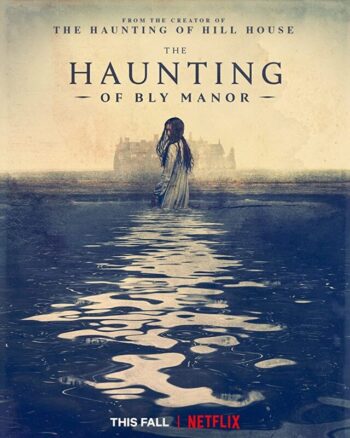
THE HAUNTING OF BLY MANOR
Mike Flanagan’s projects often come with high expectations. Aside from the seal of quality that is his own name, his recent work has included two super-tricky Stephen King adaptations, with one of them being a follow-up to The Shining. Here we have a semi-sequel to the great Haunting of Hill House, that (very loosely) adapts Henry James’ quintessential ghost story The Turn of the Screw. It makes one wonder if he misses the no-expectations days of doing a prequel to Ouija. Not that’s it’s all him here. He hands over directorial duties for most of this season, doing only one episode of the nine. You’d never notice though: there’s a consistent dreamy visual style throughout. Flanagan is also still, to my knowledge, the showrunner -meaning his fingertips are presumably all over it. However, he only wrote a single one of the nine – the first – which is also the strongest.
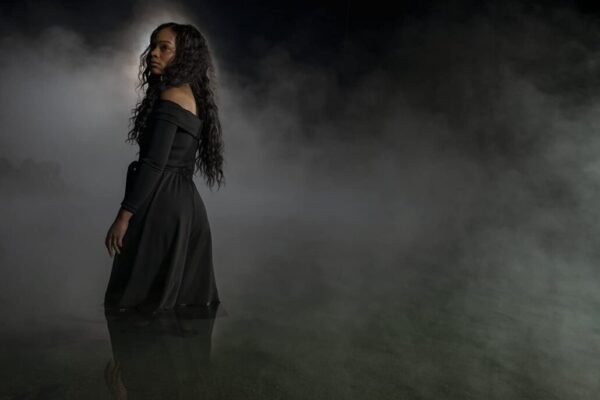
Something I assume is no coincidence as it’s also the most conventional horror one, developing a sense of intrigue and suspense that it quickly ditches in favour of dark, Gothic melodrama. It’s a shame as the setup has so much potential. A wrap-around story, taking place at a wedding, sees an unnamed woman (Gugino) telling guests, and by extension us, all about Dani (Pedretti). She’s an American woman in the 80s, who has crossed the pond, for mysterious reasons, to make a new life for herself in England. There she’s hired by the wealthy Henry Wingrave (Thomas) to care for his young nephew and niece who live in a spooky mansion in the middle of rural England – actually a very convincing Canada. Aside from the overly sweet Flora (Smith), and pint-sized Hannibal Lectoresque Miles (Ainsworth), she meets the amicable chef Owen (Kohli), the northern lass groundskeeper Jamie (Eve) and prim and proper housekeeper Hannah (Miller). At face value, it’s a perfectly splendid setup, though the thing about creepy old houses is they tend to have secrets, relayed here through another timeline –stories within stories. Plus, every bit as significant, there’s a ghost or ten.
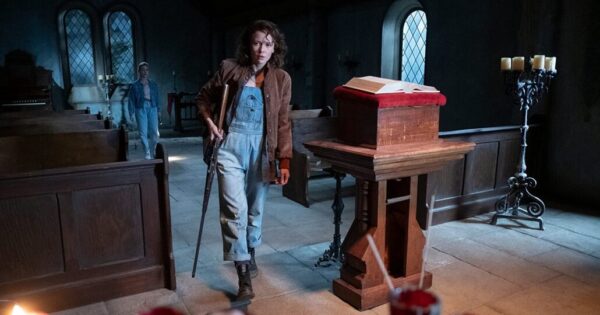
Not that you’d know it for a lot of the running time. Going in, I knew it wouldn’t be balls to the wall horror- its predecessor wasn’t, and nor is the source material it scantly borrows from. Moreover, Flanagan’s main signature is the heart he puts into everything he touches. And at his best, he uses horror as a framing device for tender human drama – most notably in Gerald’s Game. Still, as per last year’s Doctor Sleep, I think Bly Manor strays too far from the terror aspect and, save for some fleeting moments at the end of episodes, fails to establish a sense of danger. There is not much urgency, even after we know what’s going on. A large part of this is because the ghosts of the house are not very threatening, mostly showing up in the background or occupying the odd set-piece in otherwise lukewarm episodes. This isn’t to say there’s no baddy – the show has a couple of villains. However, they spend a lot of the time in the periphery: hiding in the shadows. Hence Bly Manor is rarely creepy and never visceral. I get that pacing can be a real problem: too much happens, like in AHS or bits of Bates Motel, and there’s no stakes. However, too little and you end up with this. What’s particularly frustrating is there’s even what looks like a fourth-wall-breaking bit in the finale that appears to take a dig at the audience. Berating them, smugly, for expecting something scary to happen in a horror show.
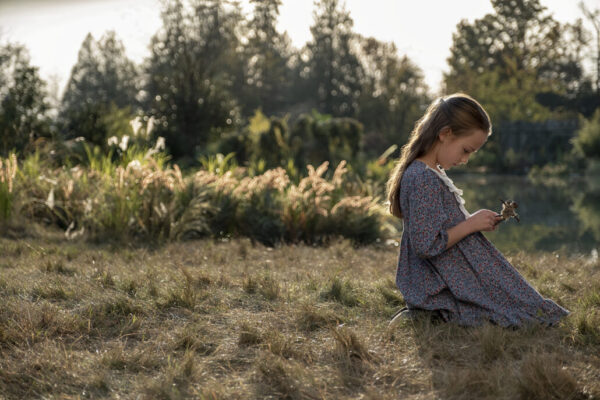
In the absence of suspense coming from the plot, it comes down to the characters to pick up the slack. Unfortunately, there’s little tension or friction between them, with too many scenes consisting of the running time consisting of nice people doing nice things for each other. Whereas Hill House routinely put its characters into constant conflict, showing how the trauma they shared had driven them apart, Bly Manor is more about lost people finding their own family. In that respect its more about people finding comfort and meaning in each other. In theory, this is consistent with the ethos of horror, giving a voice to outsiders and finding light in the darkness. But it doesn’t make for riveting drama. As with Hill House, all leads get an episode from their perspective, emphasising that they, and the ghosts we see snippets of, are the bricks which build up Bly Manor. More often than not they’re stories played for sympathy, with the ensemble mostly being defined by their victimhood or moral transgressions we immediately learn that they feel really, really bad about. They aren’t complicated or interesting enough to warrant the time we spend with them. Because the narrative relies on characters finding each other, then their stories are also necessarily less intertwined than Hill House, not adding up to the same intricate blueprint. Early on, I predicted a central character doing a heel turn towards the end for no reason other than they were too dull and almost wildly mild. No such luck. Come the end of the show they were still as uninteresting as ever, and I realised I still couldn’t uniquely describe them. The story itself is also unexpectedly simple in a way that I don’t think benefits from this sort of longwinded approach.
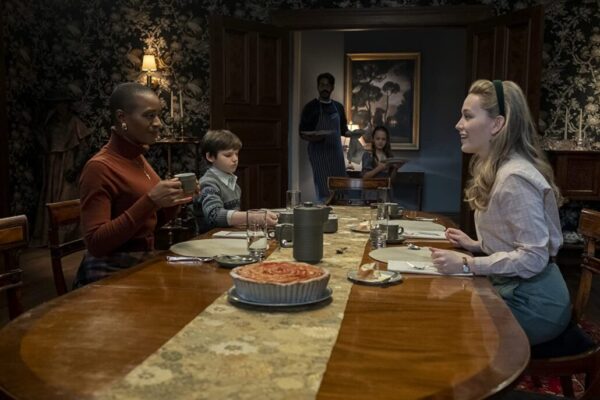
Don’t get me wrong – no matter how disappointing I find Bly Manor, it isn’t all bad, and there are some solid ideas. For instance, the show’s distinction between flashbacks and memories becomes increasingly interesting (and important) as it goes on. Episodes 5 and 7 also both have well-orchestrated third acts that manage to deliver both surprises and profound moments of melancholy. The central love plot is well done too, and some scares got me, even if the creative team leave no cliché unturned. So, there are whispers of what the show could have been if it were better paced. Speaking of which – the accents have been getting a lot of negative attention online. I thought they were mostly fine – except for the narrator and Oliver Jackson-Cohen’s attempt at Scottish. In particular, Flanagan-regular Henry Thomas wowed me (even if his accent was too far from Matthew Holness’ for me to buy them as brothers). What’s far more distracting are the Americanisms that show up every so often. No Englishperson would say ‘math’, call wool by ‘yarn’ nor arrange ‘a ride’ where a lift would do. But then, it maybe fits since Henry James, who wrote this most English of stories, was a Yankee himself.
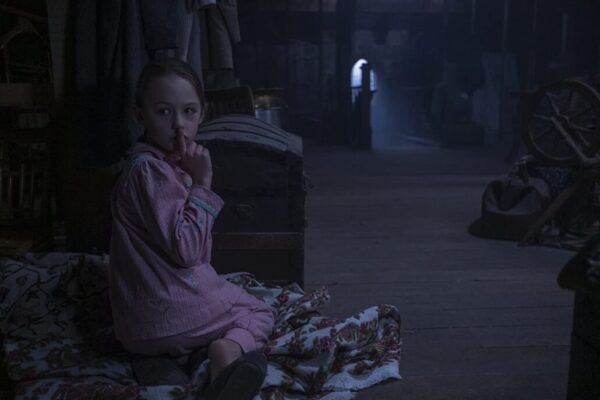
I wanted to enjoy Bly Manor more than I did. I like the main man behind it, I like the source material a lot, and I loved what came before. However, I found it to too poorly paced and lifeless for my liking – making for an unexpectedly boring sophomore season for The Haunting Of… Still, perhaps the balance between horror and drama will be better next season, with a richer cast of characters I care more about. There’s certainly no shortage of ghostly tales to choose from for the next one: there are libraries full of books about things that go bump in the night. The bits I enjoyed were also enough to convince me the magic is still there, even if I was not particularly enamoured with the story this time around. Great production values, and a skilled ensemble in need of a much stronger story. Oh, and Flanagan, if for any reason you’re reading this, I’d love a trip to Manderley.
The Haunting of Bly Manor is available on Netflix.


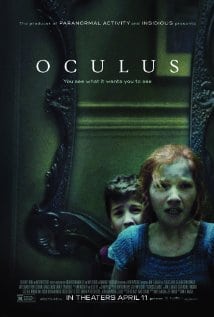
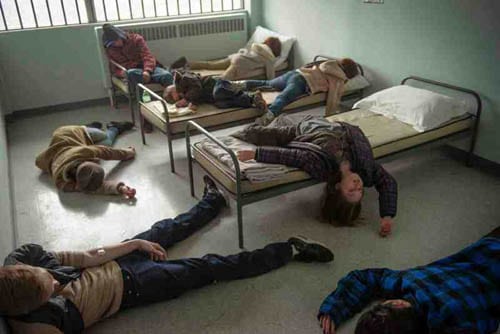

Be the first to comment